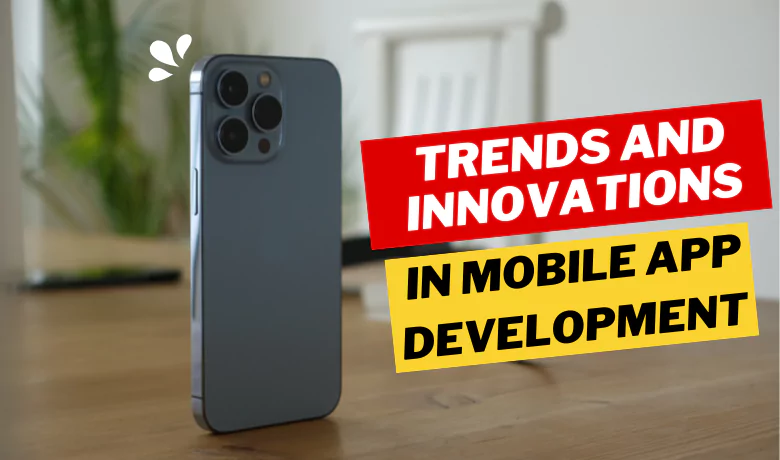
Posted On : 14-06-2023 15:46:00
Trends and Innovations in Mobile App Development
Mobile app development has emerged as a crucial area of attention for organisations and developers alike in today's quickly changing digital ecosystem. With the increasing adoption of smartphones and the growing demand for seamless user experiences, staying up-to-date with the latest trends and innovations in mobile app development has become crucial.
Artificial Intelligence and Machine Learning:
AI and ML technologies have made significant advancements in recent years and are now being integrated into mobile app development. AI-powered chatbots, voice recognition systems, and personalized recommendations are just a few examples of how AI and ML are revolutionizing user interactions and enhancing app capabilities. Developers are leveraging AI and ML algorithms to analyze user behavior, optimize app performance, and deliver personalized experiences, ultimately improving user satisfaction and engagement.
Internet of Things (IoT) Integration:
The IoT is transforming the way we interact with devices and objects around us. Mobile apps are now being developed to connect and control IoT-enabled devices, ranging from smart home appliances to wearable gadgets. By integrating IoT capabilities into mobile apps, users can remotely monitor and manage their devices, creating a seamless and interconnected ecosystem. This trend opens up new opportunities for businesses to create innovative and interconnected experiences for their users.
Augmented Reality (AR) and Virtual Reality (VR):
AR and VR technologies have gained significant traction in recent years, and mobile app developers are leveraging these technologies to create immersive and engaging experiences. From gaming and entertainment to education and training, AR and VR are revolutionizing various industries. Mobile apps with AR and VR capabilities can provide users with interactive and realistic experiences, enabling them to visualize products, explore virtual environments, and engage with digital content in entirely new ways.
Cross-Platform Development:
With the proliferation of different mobile platforms (iOS, Android, Windows), developers are increasingly adopting cross-platform development frameworks. These frameworks allow developers to write code once and deploy it across multiple platforms, reducing development time and effort. Technologies like React Native, Flutter, and Xamarin have gained popularity due to their ability to build high-performance apps that look and feel native on different platforms. Cross-platform development streamlines the app development process and offers cost-effective solutions for businesses.
Progressive Web Apps (PWAs):
Progressive online Apps (PWAs): PWAs are online applications that make advantage of contemporary web technologies to provide users with an experience similar to that of an app. PWAs are accessible through web browsers, eliminating the need for users to download and install traditional mobile apps. They offer advantages such as offline functionality, push notifications, and fast loading speeds. With improved browser capabilities and increased user acceptance, PWAs are becoming a popular choice for businesses looking to provide seamless experiences across platforms without the need for separate app development.
Enhanced App Security:
As mobile apps store and process sensitive user data, security remains a top concern. Developers are focusing on implementing robust security measures to protect user information and prevent unauthorized access. Advanced encryption techniques, secure authentication methods, and biometric authentication are some of the security features being integrated into mobile apps. Additionally, complying with data protection regulations such as the General Data Protection Regulation (GDPR) ensures that user privacy is upheld.
Cloud-Based Mobile Apps:
Cloud computing has transformed the way apps are developed and deployed. Cloud-based mobile apps leverage the power of remote servers to store data and perform complex tasks, reducing the burden on the user's device and improving scalability. With cloud-based apps, users can access their data from multiple devices and enjoy seamless synchronization. Moreover, cloud-based infrastructure enables developers to roll out updates and bug fixes more efficiently, enhancing the overall user experience.
On-Demand Apps:
The rise of on-demand services has led to the emergence of on-demand apps across various industries, including transportation, food delivery, and healthcare. On-demand apps provide users with convenience and instant access to services with just a few taps on their mobile devices. These apps typically involve real-time tracking, seamless payment integration, and personalized experiences. On-demand app development requires a strong focus on user experience, efficiency, and reliability.
Wearable Apps:
The wearable technology market has witnessed significant growth in recent years, with smartwatches, fitness bands, and other wearables becoming increasingly popular. Developers are now creating apps specifically designed for wearable devices, providing users with convenient access to essential information and services on their wrists. Wearable apps often focus on health and fitness tracking, notifications, and quick interactions, making them an integral part of users' connected lifestyles.
Voice-Activated Apps:
With the proliferation of voice assistants like Amazon Alexa, Google Assistant, and Apple Siri, voice-activated apps have gained momentum. Users now expect apps to have voice command capabilities for tasks such as searching, controlling smart devices, or making hands-free transactions. Developers are integrating voice recognition technology into their apps to provide a more intuitive and convenient user experience, enabling users to interact with apps using natural language.
Conclusion
The development of mobile apps is still progressing quickly due to new technologies and shifting consumer expectations. Artificial intelligence, IoT integration, AR/VR, cross-platform development, PWAs, enhanced security, cloud-based apps, on-demand services, wearable apps, and voice-activated apps are among the prominent trends and innovations shaping the industry. Staying abreast of these trends and incorporating them into app development strategies will enable businesses and developers to create cutting-edge, user-centric mobile experiences that drive engagement and growth in the ever-evolving digital landscape. Having any difficulty in Mobile App development in Delhi feel free to contact us.
Copyright 20-2025 Jaimru Technology Private Limited | All Rights Reserved.